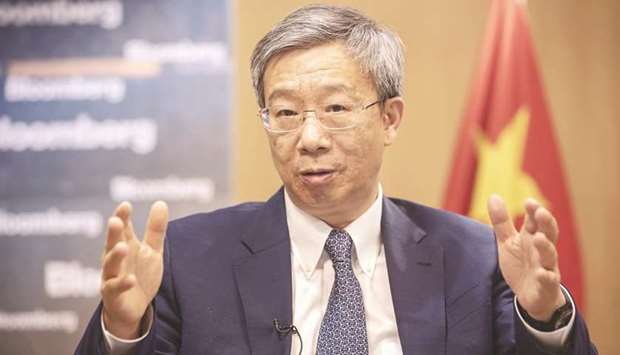China’s central bank governor reiterated the nation’s commitment to further opening up its financial sector and lowering market barriers to foreign investors.
“The new development pattern is not to close the door and to operate in isolation,” People’s Bank of China Governor Yi Gang said in a speech at the 2020 Bund Summit in Shanghai yesterday. “Rather it is to make better use of the markets and resources at home and abroad so as to achieve a more robust and sustainable development.”
Yi said regulators should be vigilant about potential hazards as the nation opens up and to build various “firewalls” to improve its ability to prevent and resolve major risks.
The reform of the yuan exchange-rate formation mechanism and the internationalisation of the currency should be jointly promoted with the financial opening-up, he said.
“The yuan internationalisation should be market-oriented,” he said. “The regulator’s main job is to reduce restrictions on the cross-border use of the currency, and let it take its own course.”
Speaking at the same conference, former PBoC Governor Zhou Xiaochuan said China’s high savings rate will change amid the adoption of a “dual circulation” strategy, a policy focus that aims to make the economy more self-sufficient. He also said the pandemic will curb the ability of emerging nations to repay their debt.
Meanwhile China is reconsidering its strategy for the internationalisation of yuan after completing a comprehensive review recently, according to a senior central bank official.
“As everybody knows in the past, the internationalisation of the RMB sticks to the market principles,” Zhu Jun, director general of the People’s Bank of China’s international division, said at the Bund Summit in Shanghai yesterday. “The role of the authorities was mainly focused on removing the policy obstacles for the free use of the currency. At this moment, we think there are some kind of complications of the domestic and overseas situations.”
Zhu said going forward the government can be more proactive with policy support to facilitate the role of the markets. For instance, the central bank can improve bilateral currency swap agreements to better promote trade and investments, and try to co-ordinate various means of yuan cross-border settlements and payments infrastructure.
Meanwhile, the authorities will remove existing obstacles for the yuan internationalisation, with a a steady liberalisation of the capital account and increasing the RMB exchange rate flexibility as well as improving liquidity in the bond market, Zhu said.
While China over the years made some progress -- promoting offshore yuan trading, winning official reserve-currency status from the International Monetary Fund and launching commodity contracts priced in yuan -- the renminbi is a small player on the global stage, with 2% market share.
And while a steady opening of China’s financial markets to overseas investors has lured inflows, foreign ownership of mainland stocks and bonds is relatively minor. China’s capital account, a term for the flow of funds across borders, currently remains subject to significant regulations on the transfer of the yuan.

Yi: Aiming to make economy more self-sufficient.
